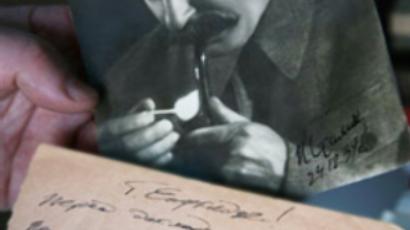Ssshhh! Guess who's 90 today!
KGB is the Russian abbreviation for Committee for State Security, the organisation serving as the Soviet Union's premier security agency, secret police and intelligence agency. It is now known as the FSB (Federal Security Service) and is marking 90 years
The first incarnation of the KGB, the Cheka, was established on December 20, 1917. It was headed by Felix Dzerzhinsky. At first there were only 23 employees. Amongst its first objectives was to stop the looting of wine cellars and profiteering – but it did not stay that way.
“Secret services are necessary, but when they meddle with politics it leads not only to their moral degradation, but to tragic consequences for the country,” said Lyudmila Mikhailova, Director of the VCHK (Cheka) Museum.
In Autumn 1918, Vladimir Lenin instigated 'the Red Terror' to destroy all those who opposed the Bolsheviks. The Cheka had the power to arrest, try and execute thousands of political opponents and insurgents.
In 1921 it numbered over 30,000 officers, agents and even border guards. Despite the end of the Civil War, the terror continued to escalate in Stalin's time.
Ranging from former top army and party leaders down to rich peasants, there were more than 4 million political prisoners across the Soviet Union.
In the Great Purge in 1937, 700,000 were executed in just one year. More than 20,000 were killed at one location, a firing range just outside Moscow.
“The Communists never felt secure in their power, because they won it illegitimately. To support their regime, they needed to manufacture an enemy and to have an obedient army of Chekists to deal with that enemy. Even the Party was scared of the KGB,” said writer Simeon Vilensky, a victim of repression.
The Soviet Security Services did not only fight internal enemies. While known at the time as the NKVD, they played an important part during WW2. Its agents were in charge of decoding enemy communications and spying behind enemy lines. By that time the Soviet Security Services had a well established intelligence network abroad.
“We consider ourselves heirs to the Cheka. The principles formulated by Felix Dzerzhinsky are still valid today. It is patriotism, dedication to your craft, and maximum effort,” said Nikolay Ivanov, an FSB Officer.
At the height of the Cold War, the organisation, which changed its name again to the KGB, maintained thousands of agents in foreign countries. At home its web of millions of informers permeated every sphere of public life.
But the secret services were unable to ensure ideological compliance.
When the failed coup of 1991 signalled the end of the Soviet Union, thousands of people gathered outside the KGB headquarters, and hauled down the statue of its founder, Felix Dzerzhinsky.
Russia's security agents were no longer at the service of a totalitarian regime.













